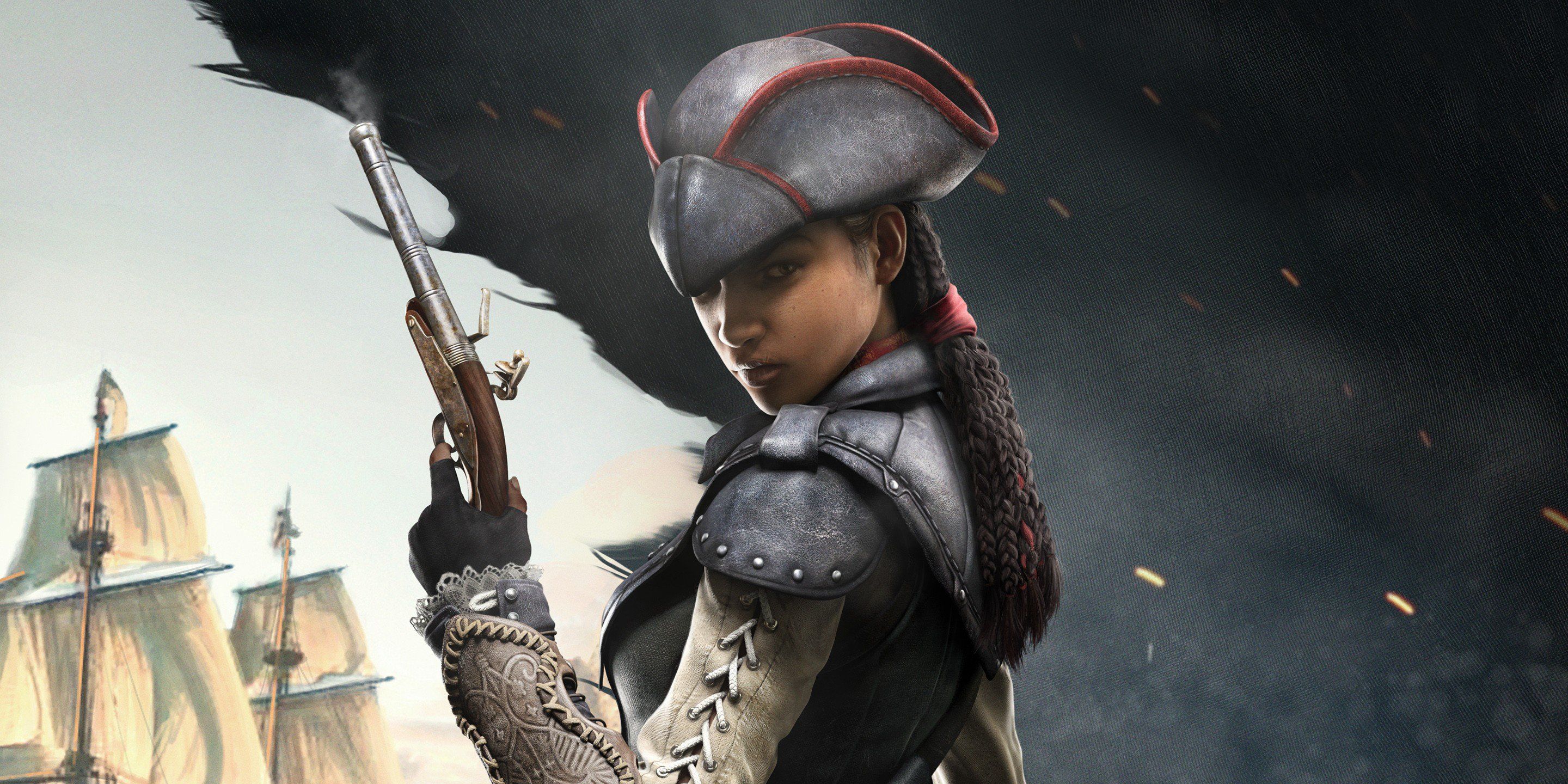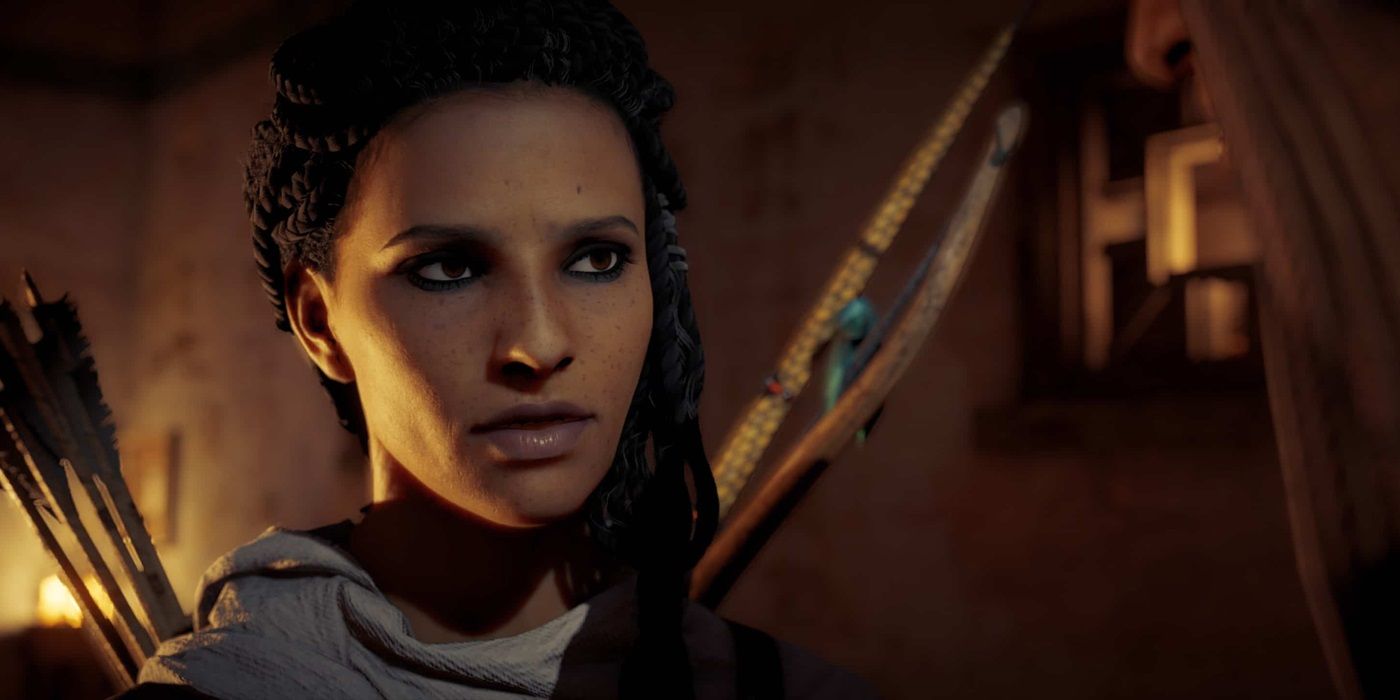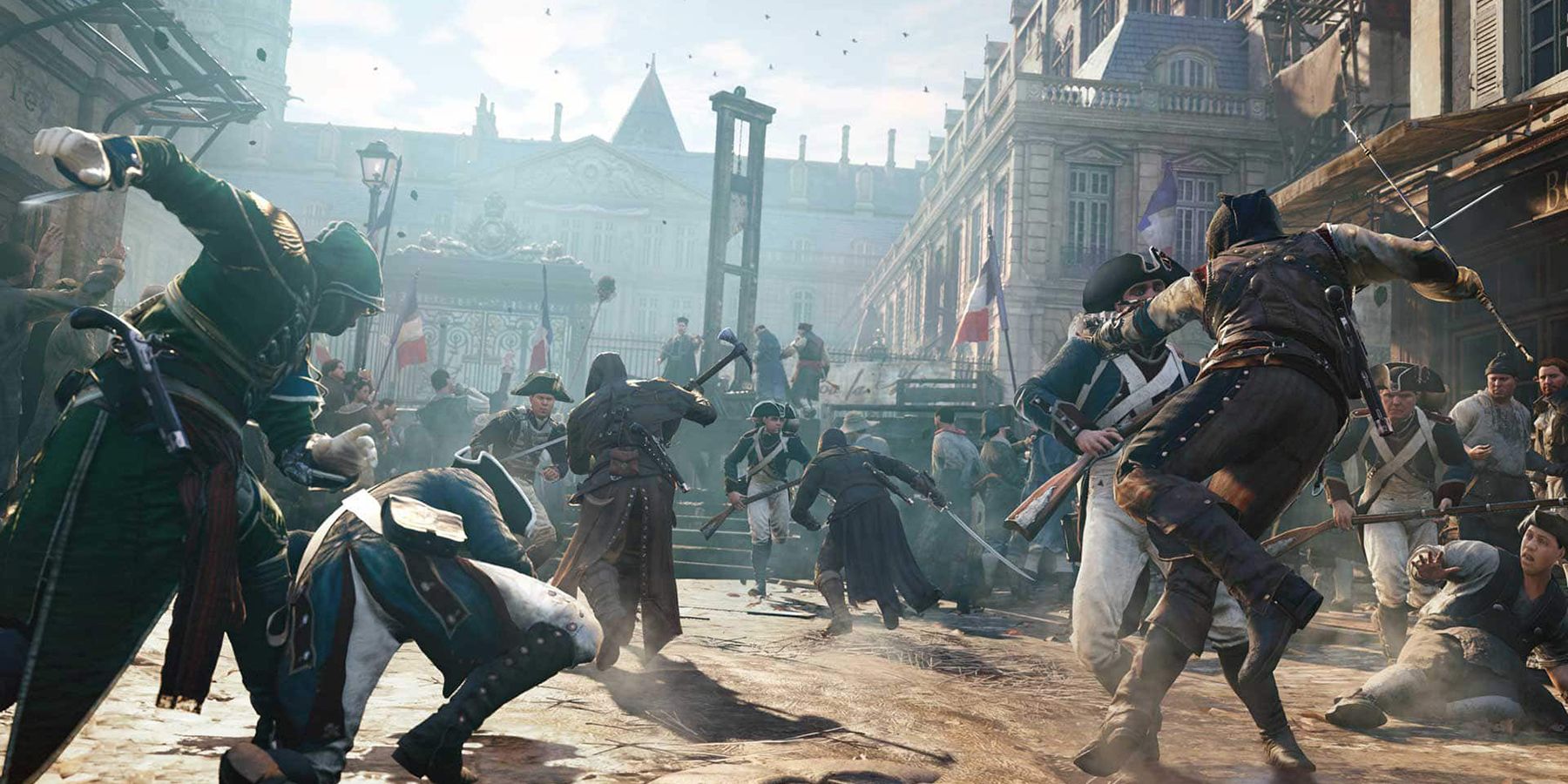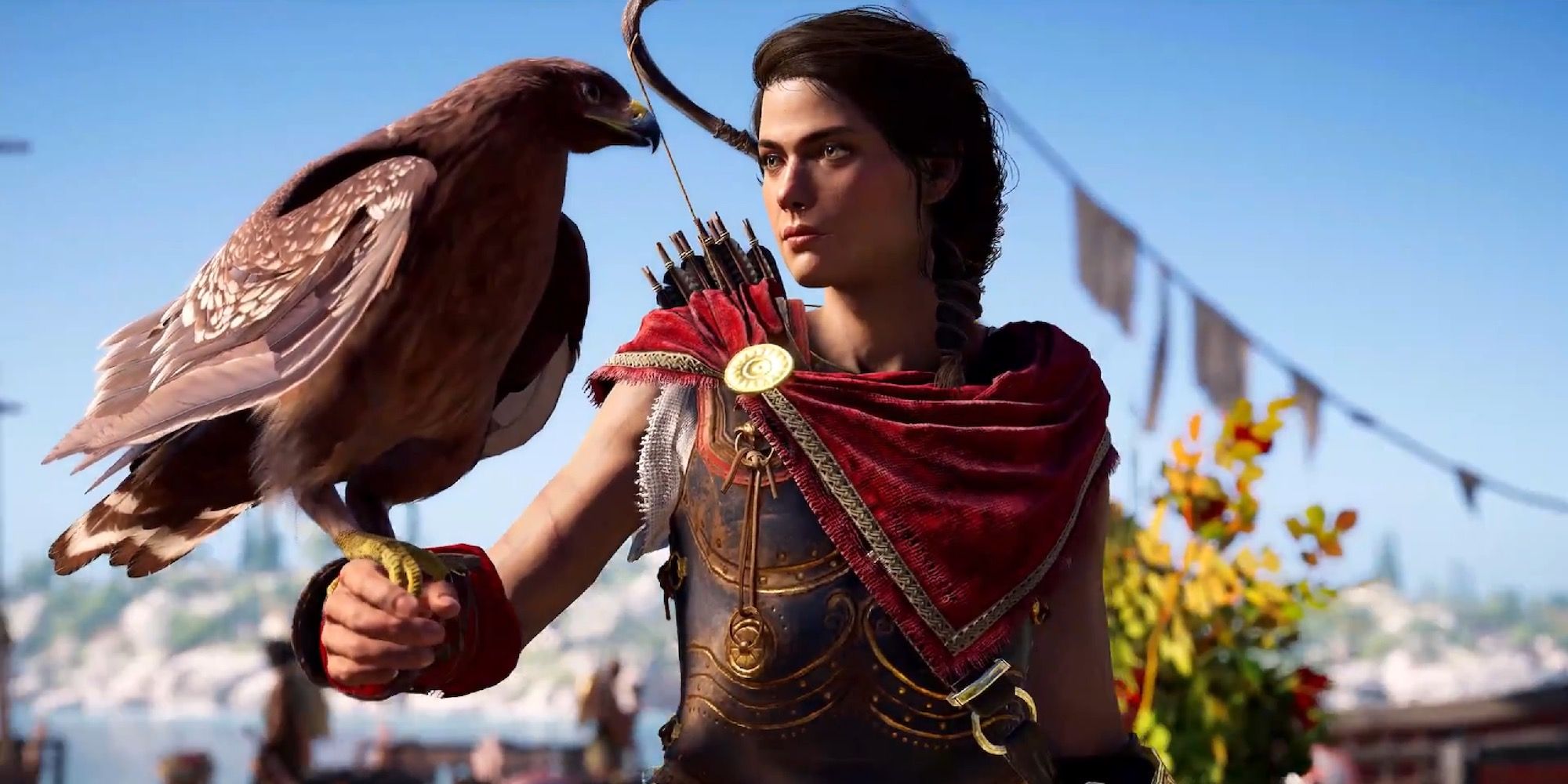Ubisoft's Assassin's Creed is a prolific franchise, spanning twelve main-story games (including upcoming Assassin's Creed Valhalla), several spin-offs, and multiple eras and locations. It proclaims at the beginning of every game to be a work of a multicultural team that includes various faiths, sexual orientations, and gender identities. Yet time and time again, Ubisoft has managed to overlook their female characters or push them to the sidelines.
Assassin's Creed is an ongoing action game series revolving around the centuries-long war between two shadow organizations, the Assassins and the Templars. The games have been set everywhere from Ancient Egypt to the Crusades to the American Revolution. The games have mostly been led by a different protagonist every game and have had a modern-day conspiracy plot line interwoven into each title to various degrees.
Most recently, Assassin's Creed has come under scrutiny after a series of scandals at Ubisoft involved executives who had a hand in the franchise. Some of the scandals have revolved around sexual misconduct, but others directly involved the development process of several Assassin's Creed games. Reports have included multiple instances where Assassin's Creed games began development with a female protagonist, only to be told by marketing to shift the focus onto a male character instead.
How Assassin's Creed Sidelines Most of Its Female Characters
The Assassin's Creed franchise has had multiple playable female characters over the years, but those characters have largely either had to share the spotlight with a male counterpart, or have starred in smaller spinoff games. The very first lead playable female assassin was in Assassin's Creed 3: Liberation, a spinoff game that starred Aveline de Grandpré, an assassin fighting templars in eighteenth century New Orleans. It was also only available at launch on the PlayStation Vita. Although Assassin's Creed 3: Liberation was eventually remade and rereleased on more mainstream platforms like Xbox 360, it's telling that the first lead female assassin was in a game aimed at a very niche market. Likewise, one of the only other times a female assassin received a solo spotlight was when Shao Jun led Assassin's Creed Chronicles: China, one of three games in a 2.5D platformer spinoff collection released by Ubisoft.
Assassin's Creed Syndicate was the first main Assassin's Creed game to star a woman as a female playable character in the form of Evie Frye, but she shared the stage with twin brother Jacob, who was also a playable character. Although players could swap to Evie for open-world exploration, many of the game's main missions required players to use Jacob; a smaller subset required the use of Evie. It was later revealed from multiple Ubisoft sources that while the twins were supposed to have equal play time, marketing insisted on shifting the focus of Assassin's Creed Syndicate to Jacob. The cover art for Assassins Creed Syndicate reflects this shift of focus, with Jacob placed front and center on the box and Evie standing off to the side.
Perhaps even stranger is the case of Lydia Frye, the playable female lead of a hidden campaign in Assassin's Creed Syndicate. Once players reach a certain point in Assassin's Creed Syndicate's story, a new waypoint on the edge of the map is revealed with little-to-no fanfare. Players who traveled to the waypoint found a portal that took them from nineteenth century London to the year 1916. There they played as Lydia Frye, Evie's granddaughter, in a series of missions set in World War I. Once again, a female playable character was given almost no marketing by Ubisoft, and the Darkest Hour campaign was treated as a "secret" game hiding within Assassin's Creed Syndicate.
After returning to a lead male protagonist in Assassin's Creed Origins (with a few missions playable as Bayek's wife-and-fellow-assassin Aya), Ubisoft's most recent handling of playable female characters has been to simply give players the option of choosing if they want a male or female avatar. It would have been nice for a woman to have a game all to herself, but the option to play a main Assassin's Creed game as a woman from start to finish is a welcome one. While Assassin's Creed Odyssey had players choose between siblings Kassandra and Alexios, Assassin's Creed Valhalla simply let's players decide if main character Eivor is a man or a woman. Additionally, Assassin's Creed Valhalla will let players change the gender of Eivor whenever they want.
Ubisoft's Assassin's Creed Female Character Controversies
Ubisoft's controversial handling of playable female characters goes all the way back to 2014, when in an interview with Polygon, Ubisoft creative director Alex Amancio claimed that there were no playable female models in Assassin's Creed Unity's co-op multiplayer mode because it was too much additional work. Developers of the game argued it would double the work load and require 8000 new animations to be created. The internet immediately took issue with that statement, with former Assassin's Creed 3 animation director Jonathan Cooper stating that most of the extra animation would have only required a few extra days. To back up his claims, Cooper revealed that Aveline, the playable female lead of Assassin's Creed 3: Liberation, had largely used copied animations from Assassin's Creed 3 lead character Connor. Only a handful of animations, like Aveline's walk, were created fresh, to give the character a more feminine feel. Despite the online backlash, Assassin's Creed Unity's multiplayer launched without female models.
Ubisoft managed to avoid further major controversies until June 2020, when a wave of scandals at Ubisoft forced multiple resignations. Besides many troubling accusations about the company's workplace culture and allegations of sexual misconduct, reports began to surface about changes that had been made to playable protagonists in various Assassin's Creed games, usually at the behest of then-Chief Creative Office Serge Hascoët. According to reporting by Bloomberg, Assassin's Creed Origins, for instance, originally meant to center much of the game on female assassin Aya, making her husband Bayek a side character. The final game saw those roles reversed. Assassin's Creed Odyssey was to have been the first main game in the series (after ten other games) where a female character was the sole lead, but once again, reports claim that Ubisoft marketing demanded the addition of a playable male character on the grounds that games with female lead characters don't sell, despite many examples to the contrary.
Is Ubisoft Ready to Change?
There was hope that summer 2020 would be a wake-up call for how Ubisoft treats women, both within the company and within their games. The significant resignations and firings at the company were a step in the right direction, but Ubisoft still doesn't seem fully committed to change. Ubisoft CEO Yves Guillemot recorded an apology for company missteps ahead of the September Ubisoft Forward, but the video was only posted to Ubisoft's Twitter account the day of the event. When asked why the video hadn't been part of the actual Ubisoft Forward stream, Ubisoft cited "timing constraints" - despite the fact that Ubisoft Forward was a standalone online event entirely at Ubisoft's discretion.
To top it off, the Assassin's Creed UK Twitter account recently tweeted out a video to celebrate the return of the hidden blade weapon to the franchise, showing off the many, many times the weapon has been used in the games. The video, which showed off every main Assassin's Creed game, left out Evie Frye and the female Eivor (Kassandra from Assassin's Creed Odyssey didn't use a hidden blade). A recut video added female characters, including Evie and Aveline, but chose to end the reel on a split screen of the male and female versions of Assassins' Creed Valhalla's Eivor, instead of giving female Eivor the full screen. Ubisoft's marketing clearly felt the need to reassure players there was a male avatar in Assassin's Creed Valhalla.
The fact that Ubisoft, after an entire summer of controversy, could overlook their female characters (either accidentally or intentionally) as they celebrate the history of the Assassin's Creed franchise, doesn't bode well for any immediate changes of culture at the company. At least Ubisoft has come as far as letting players choose to use a female character, and there will be many excited female Viking assassins raiding a virtual England this fall.
Source: Polygon, Bloomberg, Ubisoft, Assassin's Creed UK




